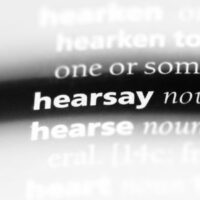Understanding Some Basics About Hearsay Evidence

After being arrested and formally charged with a crime in New York, you need to work with a criminal defense attorney who can help you gather evidence that can help your case. When gathering evidence, your attorney will ensure they only collect evidence that can be used in court. There are various types of evidence that your attorney can use to help you with your criminal case, and they are:
- Documentary evidence – This is evidence introduced through documents. Examples of documentary evidence include newspapers, diary entries, and contracts.
- Testimonial evidence – This is when a witness goes in front of the court and says what they saw or heard under oath.
- Demonstrative evidence – This is evidence that can help demonstrate the testimony of a witness. A map of a crime scene is an example of demonstrative evidence.
- Real evidence/Physical evidence – This is evidence that a jury can see and touch. Examples of real evidence include DNA samples and fingerprints.
Generally, if any of the above evidence is to be admitted in a criminal court, it must be relevant, material, and competent.
When it comes to testimonial evidence, one type of evidence that confuses many is the evidence known as “hearsay evidence.” In an attempt to help you grasp the concept of hearsay, we will discuss some basic information about hearsay evidence in this article.
What Is Hearsay?
Unfortunately, many people have heard of the term hearsay, but not many understand the meaning of this word. According to New York law, hearsay is an out-of-court statement offered in evidence to prove the truth of the matter asserted in the statement. Hearsay may be written, oral, or non-verbal.
Generally speaking, in the state of New York, hearsay evidence is not admissible. However, it is important for you to keep in mind that there are exceptions to the hearsay exclusion. According to the law, hearsay is admissible if it falls within an exception to the hearsay rule.
Why Is Hearsay Not Admissible Evidence?
The main reason hearsay is not admissible evidence is that one cannot cross-examine the individual making the statement since that individual is not in court. The individual in court or the document presented in court merely repeats what the person who is not in court said.
Some Common Exceptions to the Hearsay Exclusion
As mentioned earlier, exceptions to the hearsay exclusion exist. For instance, you can admit a statement into evidence if the purpose is not to prove the truth of the out-of-court statement but rather to prove something that was heard or seen directly. Generally, such a statement is not considered hearsay.
Another exception to the hearsay exclusion is the hearsay exception for an “excited utterance.” Such an utterance may be admissible in a criminal court because courts believe it is hard for an individual to make up false statements when under the excitement or stress of a startling event.
Other exceptions to the hearsay exclusion include present sense impressions and dying declarations.
Get Legal Help From an NYC Criminal Defense Attorney
If you are currently facing a criminal accusation and have questions about hearsay evidence or any other type of evidence, contact Mark I. Cohen, an experienced NYC criminal defense attorney, to get the answers you need.
Resource:
nycourts.gov/judges/evidence/8-HEARSAY/ARTICLE-8-RULES.pdf








